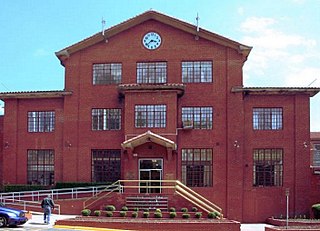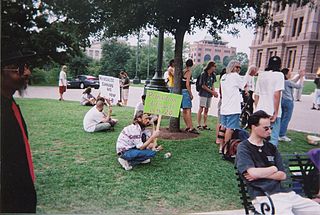Related Research Articles

Texas is the most populous state in the South Central region of the United States. It borders Louisiana to the east, Arkansas to the northeast, Oklahoma to the north, New Mexico to the west, and an international border with the Mexican states of Chihuahua, Coahuila, Nuevo León, and Tamaulipas to the south and southwest. Texas has a coastline on the Gulf of Mexico to the southeast. Covering 268,596 square miles (695,660 km2), and with some 30.5 million residents as of 2023, it is the second-largest state by both area and population. Texas is nicknamed the Lone Star State for its former status as an independent republic.

Fort Bend County is a county located in the U.S. state of Texas. The county was founded in 1837 and organized the next year. It is named for a blockhouse at a bend of the Brazos River. The community developed around the fort in early days. The county seat is Richmond. The largest city located entirely within the county borders is Sugar Land. The largest city by population in the county is Houston; however, most of Houston's population is located in neighboring Harris County.
A memorandum of understanding (MoU) is a type of agreement between two (bilateral) or more (multilateral) parties. It expresses a convergence of will between the parties, indicating an intended common line of action. It is often used either in cases where parties do not imply a legal commitment or in situations where the parties cannot create a legally enforceable agreement. It is a more formal alternative to a gentlemen's agreement.

The Supreme People's Procuratorate of the People's Republic of China (SPP) is the highest national agency responsible for legal prosecution and prosecutorial investigation in China. The SPP reports to the National People's Congress (NPC).
The structure of the judiciary of Texas is laid out in Article 5 of the Constitution of Texas and is further defined by statute, in particular the Texas Government Code and Texas Probate Code. The structure is complex, featuring many layers of courts, numerous instances of overlapping jurisdiction, several differences between counties, as well as an unusual bifurcated appellate system at the top level found in only one other state: Oklahoma. Municipal Courts are the most active courts, with County Courts and District Courts handling most other cases and often sharing the same courthouse.

South Texas College of Law Houston is a private law school in Houston, Texas. Founded in 1923, it is accredited by the American Bar Association. South Texas College of Law Houston is the oldest law school in the city of Houston. It was founded in 1923 when the YMCA made the decision to establish a law school with a focus on offering night classes for working professionals.

Capital punishment is a legal penalty in the U.S. state of Texas for murder, and participation in a felony resulting in death if committed by an individual who has attained or is over the age of 18.
The Texas Courts of Appeals are part of the Texas judicial system. In Texas, all cases appealed from district and county courts, criminal and civil, go to one of the fourteen intermediate courts of appeals, with one exception: death penalty cases. The latter are taken directly to the Texas Court of Criminal Appeals, the court of last resort for criminal matters in the State of Texas. The highest court for civil and juvenile matters is the Texas Supreme Court. While the Supreme Court (SCOTX) and the Court of Criminal Appeals (CCA) each have nine members per the Texas Constitution, the sizes of the intermediate courts of appeals are set by statute and vary greatly, depending on historical case filings and so that the justices on each court can timely adjudicate the volume of cases regularly before them. The total number of intermediate appellate court seats currently stands at 80, ranging from three, four, six, seven, nine, and thirteen (Dallas) per court.

The Harris County Sheriff's Office (HCSO) is a local law enforcement agency serving the over four million citizens of Harris County, Texas, United States. It is headquartered on the first and second floors in the 1200 Baker Street Jail in Downtown Houston.

The Fifth Amendment to the United States Constitution creates several constitutional rights, limiting governmental powers focusing on criminal procedures. It was ratified, along with nine other amendments, in 1791 as part of the Bill of Rights.
The term county judge is applied as a descriptor, sometimes as a title, for a person who presides over a county court. In most cases, such as in Northern Ireland and the Victorian County Courts, a county judge is a judicial officer with civil or criminal jurisdiction. In the United States, however, there are some "County Courts" which exercise primarily administrative functions, in which case the County Judge may exercise largely or solely executive authority and be equivalent to the county executive in other local government areas.

Houston Community College (HCC), also known as Houston Community College System (HCCS), is a community college system that operates community colleges in Houston, Missouri City, Greater Katy, and Stafford in Texas. It is notable for actively recruiting internationally and for the large number of international students enrolled, over 5,700 in 2015. Its open enrollment policies, which do not require proficiency in English, are backed by a full-time 18-month English proficiency program and remedial courses.

Thomas Campbell Clark was an American lawyer who served as the 59th United States Attorney General from 1945 to 1949 and as Associate Justice of the Supreme Court of the United States from 1949 to 1967.
Communist attitudes towards LGBTQ rights have evolved radically in the 21st century. In the 19th and 20th century, communist parties and Marxist–Leninist states varied on LGBTQ rights; some Western and Eastern parties were among the first political parties to support LGBTQ rights, while others, especially the Soviet Union and some of its Eastern Bloc members, harshly persecuted people of the LGBTQ community.

North Vietnam, officially the Democratic Republic of Vietnam, was a country in Southeast Asia from 1945 to 1976, with its sovereignty fully recognized in 1954. A member of the communist Eastern Bloc, it opposed the French-supported State of Vietnam and later the Western-allied Republic of Vietnam. North Vietnam emerged victory over the South in 1975 and ceased to exist the following year when it unified with the south to become the current Socialist Republic of Vietnam.
In 2014 there were 923,348 crimes reported in the U.S. state of Texas, including 1,184 murders and 8,236 rapes.

Warren Kenneth Paxton Jr. is an American politician and lawyer who has served as the attorney general of Texas since 2015. A member of the Republican Party, he previously served in the Texas Senate representing the eighth district and as a member of the Texas House of Representatives.

Lesbian, gay, bisexual, transgender, and queer (LGBTQ) people in Texas have some protections in state law but may face legal and social challenges not faced by others. Same-sex sexual activity was decriminalized in Texas in 2003 by the Lawrence v. Texas ruling. On June 26, 2015, the Supreme Court of the United States ruled bans on same-sex marriage to be unconstitutional in Obergefell v. Hodges.

Gun laws in Texas regulate the sale, possession, and use of firearms and ammunition in the U.S. state of Texas.

Cannabis in Texas is illegal for recreational use. Possession of up to two ounces is a class B misdemeanor, punishable by up to 180 days in prison and a fine of up to $2000. Several of the state's major municipalities have enacted reforms to apply lesser penalties or limit enforcement, however.
References
- ↑ Constitution of the CPUSA
- 1 2 "Government Title 5, Chapter 557. Sedition, Sabotage, and Communism". Texas Statutes. Retrieved 2021-01-19.
- 1 2 Cofer, Cody L. (April 22, 2016). "Commies Beware… Chapter 557 of the Texas Government Code is Here!". CoferLaw. Fort Worth Criminal Defense Lawyers. Archived from the original on 17 May 2016.
- ↑ Bonewell, Shaffer Allen (2019). Manipulating Fear: The Texas State Government and the Second Red Scare, 1947-1954 (PDF). Masters thesis. Denton, Texas: University of North Texas. p. 107. Archived (PDF) from the original on 15 August 2021.
